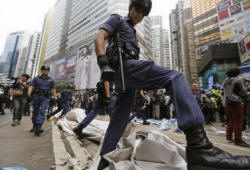|
 Hong
Kong police clear last pro-democracy protest sites Hong
Kong police clear last pro-democracy protest sites
 Send a link to a friend
Send a link to a friend
[December 15, 2014]
By Donny Kwok
HONG KONG (Reuters) - Hong Kong
authorities arrested several pro-democracy activists on Monday as they
cleared the last of three protest sites, marking the closure of
demonstration camps in the city that have blocked streets for more than
two months.
|
|
 About 100 police swept into Causeway Bay, a shopping district
popular with mainland Chinese tourists, to remove barricades as
protesters scrambled to pack up belongings from the smallest of the
three main sites. About 100 police swept into Causeway Bay, a shopping district
popular with mainland Chinese tourists, to remove barricades as
protesters scrambled to pack up belongings from the smallest of the
three main sites.
One protester played drums next to a cardboard cut-out of Chinese
President Xi Jinping as onlookers stood by. Police arrested more
than a dozen protesters, including some elderly people, after they
sat down and refused to move.
"I don't think it's a failure. This is not the end," said protester
K.T Tang, a legal executive. "I hope the next time when we gather in
the streets, we will be celebrating, instead of shedding tears for
achieving nothing."
Authorities dragged away tents and other belongings and dumped them
in trucks as the site was cleared and roads reopened. Police had
announced on the weekend they would take action to clear the area.
 The mainly peaceful protests have represented one of the most
serious challenges to China's authority since the 1989 pro-democracy
demonstrations and bloody crackdown in and around Beijing's
Tiananmen Square.
On Thursday, police cleared most of the main protest site in the
Admiralty district next to government headquarters, arresting scores
of activists in a largely peaceful operation.
That followed the clearance in late November of a site in the Mong
Kok neighborhood across the harbor from the main business district,
a move that sparked several nights of clashes between demonstrators
and police.
Hong Kong, a former British territory, returned to Chinese rule in
1997 under a "one country, two systems" formula that gives it more
autonomy and freedom than the mainland and a goal of universal
suffrage.
[to top of second column] |

The protesters are demanding open nominations in the city's next
election for chief executive in 2017. Beijing has said voters will
only be able choose from pre-screened candidates.
A handful of holdout protesters were also cleared from outside the
Legislative Council building later on Monday.
Protest leaders have said they will consider other forms of civil
disobedience, given Beijing's refusal to grant any concessions.
As the dust settles on the protests, China is likely to embark on a
sweeping but covert campaign across the territory's judiciary, media
and universities to ensure there is no recurrence, activists and
politicians say.
(Additional reporting by Lizzie Ko and Venus Wu; Writing by Anne
Marie Roantree; Editing by Paul Tait and Robert Birsel)
[© 2014 Thomson Reuters. All rights
reserved.] Copyright 2014 Reuters. All rights reserved. This material may not be published,
broadcast, rewritten or redistributed.
 |